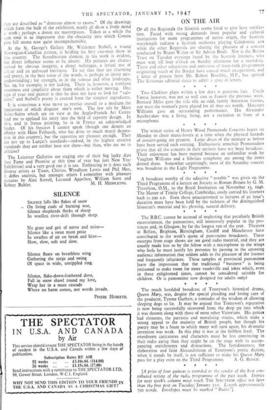ON THE AIR
OF all the Regionals the SConish seems fated to give least satisfac- tion. Faced with strong demands from popular and cultural institutions for more programmes of native origin, the Scottish wavelength radiates a Scottish orchestra playing Caledonian airs while the other Regionals are sharing the pleasure of a concert conducted by Bruno Walter or Sir Adrian Boult. Nor is the Brains Trust on Tuesday evenings heard by the Scottish listeners, who must wait till four o'clock on Sunday afternoon for a recording. These and other relegations and omissions of front-rank programmes originating south of the Border have caused much exasperation, and a letter of protest from Mr. Robert Boothby, M.P., has opened The Scotsman editorial sluice to admit a spate of letters.
Two Chekhov plays within a few days is generous fare. Uncle Vanva, however, was not so well cast as Ivanov the previous week. Bernard Miles gave the title role an odd, faintly American flavour, nor were the women's parts played for all they are worth. Harcourt Williams gave an outstanding performance. His Alexander Serebryakov was a living being, not a recitation in front of a microphone.
The winter series of Henry Wood Promenade Concerts began on Monday to cheer music-lovers at a time when the physical hazards of concert-going are greatest. Large doses of the mixture as before have been served each evening. Enthusiastic armchair Promenaders grieve that all the concerts in their entirety have not been broadcast. Their enjoyment has been marred because an unfamiliar work by Vaughan Williams and a Sibelius symphony are among the items denied them. Somewhat surprisingly, most of the Saturday concert was broadcast in the Light Programme.
A broadcast worthy of the adjective "notable" was given on the Third Programme of a lecture on Society in Roman Britain by G. M. Trevelyan, 0.M., to the Royal Institution on November 15, 1946. The Master of Trinity College, Cambridge, easily carried his listeners back to 200 A.D. Even those unaccustomed to lectures of an hour's duration must have been held by the richness of the distinguished historian's material and his pleasing, natural delivery.
The B.B.C. cannot be accused of neglecting that peculiarly British entertainment, the pantomime, still immensely popular in the pro- vinces and, in Glasgow, by far the longest run of the year. Theatres at Belfast, Brighton, Birmingham, Cardiff and Manchester have contributed to the week's quota of pantomime broadcasts. These excerpts from stage shows are not good radio material, and they are usually made less so by the fellow with a microphone in the wings who feels he must justify his presence by passing to the unseeing audience information that seldom adds to the pleasure of the listener and frequently infuriates. These samples of provincial pantomime leave the impression that the traditional "business" is being jettisoned to make room for more vaudeville and jokes which, even in these enlightened times, cannot be considered suitable for children. Or is pantomime now designed for adults only?
The much heralded broadcast of Tennyson's historical drama, Queen Mary, was, despite the special pleading and loving care of the producer, Tyrone Guthrie, a reminder of the wisdom of allowing sleeping dogs to lie. It may be argued that Tennyson's reputation is now being successfully recovered front the deep pit into which it was thrown along with those of most other Victorians. His genius had elements, the patriotic and moralising strains, which make a strong appeal to the majority of British people, but though his poetry may be a fount to which many will turn again, his dramatic invention was weak. In this play it was at the feeblest level. The overdrawn caricatures and characters must be less convincing in their radio airing than they might be on the stage with its accom- panying enrichments and distractions. The fastidiousness, the elaboration and faint Alexandrinism of Tennyson's poetic diction, when it stands by itself, is not sufficient to make his Queen Mary .[A prize of four guineas is awarded to the sender of the best con- tributed review of the radio programme of the past week. Entries for next week's column must reach THE SPECTATOR office not later than the first post on Tuesday,' 7anuary 21st. Length approximately 700 words. Envelopes must be marked " Radio."1


































 Previous page
Previous page